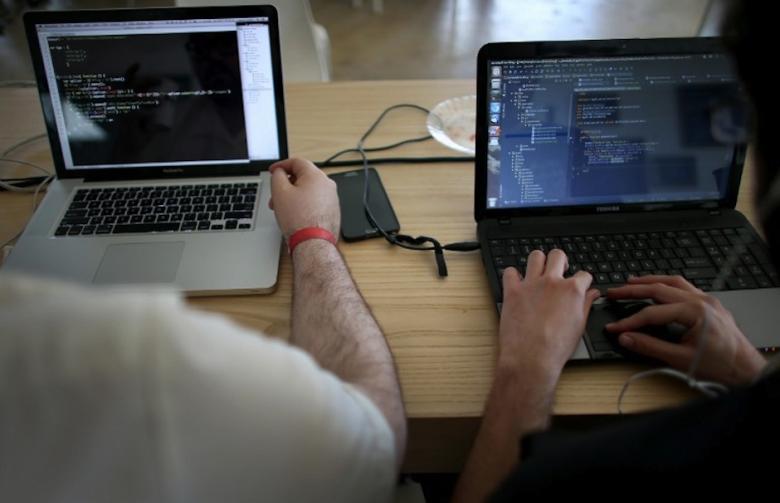
The Intercept, the investigative arm of the First Look Media organization created by eBay founder Pierre Omidyar, is being criticized for sharing information which may have led to the arrest this week of National Security Agency contractor Reality Leigh Winner.
Winner, 25, was arrested and accused of mailing classified NSA documents to "a news outlet," according to the US Justice Department, which said an investigation showed she had printed and shared the investigative report.
Did the news organization unwittingly provide clues to the government that led authorities to Winner? Some media analysts say the journalists were careless at best.
Kremlin 'resolutely' denies Russia hacked US vote
Some of the harshest criticism came from Washington Post reporter Barton Gellman, who called the case a "catastrophic failure of source protection" and argued that The Intercept "made egregious mistakes that doomed its source."
"It handed USG (US government) a color copy of original doc & told a clearance-holding contractor the doc was mailed from Augusta. Where source lived," tweeted Gellman, a two-time Pulitzer Prize winner who was part of a team reporting from documents leaked by former NSA contractor Edward Snowden.
Jake Swearingen, a technology writer for New York Magazine, said Winner made her own missteps by printing the documents in a way that could be tracked and mailing them to The Intercept.
But Swearingen added that The Intercept may have sealed Winner's fate by showing the document to a government official as part of an effort to verify its authenticity.
"It's quite reasonable for The Intercept to seek confirmation," Swearingen wrote. "But revealing the Augusta, Georgia, postmark to the third-party source clearly helped the government build its case."
The Intercept said in a statement the NSA document "was provided to us completely anonymously" and added that "we have no knowledge of the identity of the person who provided us with the document."
The news organization, which is headed by investigative reporter Glenn Greenwald, who was part of the team that first published the Snowden documents, cautioned against drawing any conclusions from FBI assertions on how it tracked Winner.
Leaked intel report shows Russian hackers probed US voting systems
"Winner faces allegations that have not been proven. The same is true of the FBI's claims about how it came to arrest Winner," the statement said.
Robert Graham of Errata Security said Winner may have been tracked by nearly invisible dots from the printer used that can determine who used the machine.
"Because the NSA logs all printing jobs on its printers, it can use this to match up precisely who printed the document," Graham said in a blog post.
"When they print things out, they includes these invisible dots, so documents can be tracked," Graham wrote, calling it "a violation of our (constitutional) rights."
Dan Gillmor, an Arizona State University journalism professor who blogs about media, said the case calls for more scrutiny.
"Hoping @theintercept will do a thorough self-examination of its source protection, or lack of it -- and make results loudly public."
Some were less charitable.
John Kiriakou, a former CIA analyst who went to jail after leaking information on US torture and waterboarding, tweeted "@theintercept should be ashamed of itself. (Reporter) Matthew Cole burns yet another source. It makes your entire organization untrustworthy."
Russian hackers 'planted false story' behind Middle East crisis
WikiLeaks, the organization which is a conduit for secret documents, said it was offering a $10,000 reward "for information leading to the public exposure & termination of this 'reporter.'"
Others said the focusing on the role of the news organization distracts from the more question of whether the leak related to an important public issue.
Snowden, who has been given asylum in Russia and is also facing prosecution for divulging secret documents, said it is inappropriate to use the Espionage Act to prosecute "whistleblowers" who reveal important news to media.
"The prosecution of any journalistic source without due consideration by the jury as to the harm or benefit of the journalistic activity is a fundamental threat to the free press," Snowden said in a blog post.
Dan Kennedy, a Northeastern University journalism professor, said most sources of leaked information understand they will eventually face consequences.
Winner "does have an argument to make that what she did was in the public interest, but I don't know if she can convince a jury of that," Kennedy said

1725783822-0/Tribune-Pic-(15)1725783822-0-165x106.webp)







1732347751-0/Express-Tribune-(1)1732347751-0-270x192.webp)







COMMENTS
Comments are moderated and generally will be posted if they are on-topic and not abusive.
For more information, please see our Comments FAQ